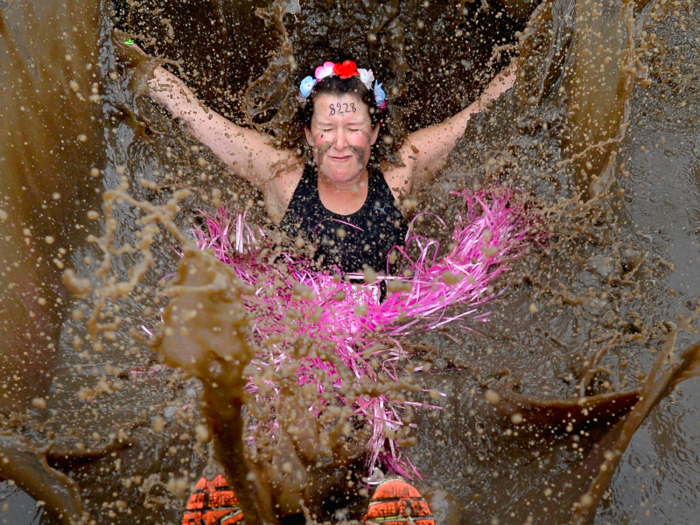How Tough Mudder grew from a Harvard Business School case study to a global TV show
How Tough Mudder grew from a Harvard Business School case study to a global TV show

How Tough Mudder grew from a Harvard Business School case study to a global TV show

Content creation makes up one of the core pillars of Will Dean's growth strategy for the future of Tough Mudder.
The partnership with Sky Sports is the only the first step in growing its content production capabilities. It's also in talks with production companies in the UK to develop regional-specific content.
Online formats have also become a key part of its content production capabilities. Tough Mudder saw 42.5 million viewers live-stream the events and it is working with Facebook and Snapchat to develop new formats and ways to showcase the stories around the events.
Growing its sponsorship and product licensing portfolios is something the company hopes to achieve through the content it produces. One Tough Mudder sponsor, the American footwear company Merrell, now produces Tough Mudder-branded shoes.
As a non-traditional sport, it has been more difficult for Tough Mudder to land bigger name sponsorships than mainstream sports but that is changing with the growth it has seen.
The US Army sponsored and co-produced the show on CBS and the company counts Jeep and cider brand Kingstone Press among its British sponsors.
How Tough Mudder grew from a Harvard Business School case study to a global TV show

It's not over for Dean, who has big ambitions to continue Tough Mudder's international expansion.
Tough Mudder is currently present in 10 countries, including the United States, Australia and China and it hosted its first event in Dubai in 2016.
Dean wants to nearly double the presence in two years, to 18 markets.
He strongly believes that as the event grows people — who pay up to $200 to beat the obstacles — will come.
"Experiences are the new luxury goods," he said. The rapid growth of Tough Mudder is a testament to that.
Tough Mudder held three events in the year it launched. Two years later, in 2012, it had organized 35 around the world.
How Tough Mudder grew from a Harvard Business School case study to a global TV show

Some of the obstacles that people have to beat in the Tough Mudder experience include submerging themselves in icy water, avoiding live electric cables or the newly created claustrophobic "Augustus Gloop" which simulates "climbing up a waterfall in a mineshaft."
At the core of Tough Mudder ethos is that contestants look to challenge themselves and be the best version of themselves.
"We live in these rat race societies and I'm very proud that we created an event that gets people outside of their comfort zone, pushes them to do something physically challenging and they feel mentally rewarding," Dean explained.
More than half of those who participate in one event return to do the event again.
Dean sees prototyping new obstacles and formats as a important part of how Tough Mudder will continue to attract more contestants and create new revenue streams for his company.
Tough Mudder is already profitable today and Dean said the company reinvests its profits in the company to further improve the events.
How Tough Mudder grew from a Harvard Business School case study to a global TV show

Dean considers his venture a success. It employs about 150 people around the world to help him manage the constant activity and the rapid growth spurts it has experienced.
"Clearly it all worked out pretty well. If I'm honest a lot harder work than I knew it was going to be," Dean said looking back at the growth of Tough Mudder.
But questions have been raised around how Dean came to the idea. An article from Outside Online found that while an MBA student at Harvard Business School, Dean asked Billy Wilson, who founded the British Tough Guy obstacle race, if he could study his business.
In return, Dean would provide a study on the feasibility of international expansion.
Dean then launched Tough Mudder in 2010, with photos and video taken at Tough Guy events, without attribution, according to the findings from the Harvard Conduct Review board.
How Tough Mudder grew from a Harvard Business School case study to a global TV show

The Review Board also found there was insufficient evidence that Dean had used confidential information from Tough Guy to start his own company.
The full report can be read here.
According to the Outside Online report, Tough Mudder settled out of court in January 2011 for an amount of $725,000.
A note posted on Tough Guy's Facebook page in 2013 says "I agreed to settle. I agreed to forgive Will Dean with the proviso that I could get back to my peaceful life, that Dean and his marketing machine would not invade England and my domain. That I would get my life back to its peaceful serene happiness."
How Tough Mudder grew from a Harvard Business School case study to a global TV show

Dean told Business Insider he didn't invent anything brand new. Obstacle races existed before he founded his company in 2010. Spartan Race, a competitor of Tough Mudder, was founded in 2007, for example.
"We put on the best events, with the biggest, and the best, and the most exciting obstacles, with the best ethos," Dean said.
He points to the charity contributions that Tough Mudder has made around the world. It raised $13 million dollars and £3 million in the UK for a variety of charities, including Help for Heroes in the UK and other veterans organizations around the world.
"If you ask me how I feel about the company and what we've got going," he said "I feel pretty good from a business perspective. I feel even better about it from a moral imperative component."
Popular Right Now
Advertisement